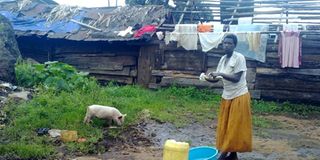Living as refugees in their own country

Ms Hellen Chemutai, washes her clothes at Rwanda refugee camp in Kween District recently. Photo by David Mafabi
What you need to know:
- In 2000, government gazetted Mt Elgon area as a national park to protect its rich biodiversity and the endangered mountain animals.
- The Kween District chairman, Paul Machinjach, says they have made reports about the poor living conditions at the camps but government is yet to respond.
KWEEN. Until early this year when former Forum for Democratic Change presidential candidate Kizza Besigye visited Rwanda and Kisangani internally displaced persons camps in Sebei sub-region, many Ugandans did not know the deplorable conditions there.
A collection of grass-thatched huts with wooden walls, and a few mud-and-wattle structures form the internally displaced people’s camps on a rocky hill in Chelibei and Kapkwata forest villages, Kwanyiny Sub-county in Kween District.
The camp is devoid of the basic necessities. The pit-latrines are filled up, heaps of rubbish dot the rocky area and there is no safe drinking water.
Victims speak out
Hellen Chemutai, 26, clearly remembers how the journey to the camp started. It was in February 2000, when a group of Uganda Wildlife Authority (UWA) rangers and Uganda Peoples’ Defence Forces (UPDF) soldiers stormed their home in Kapkwata near Mt Elgon in Kween District.
“This is not your home, you must leave, this is national park land, and you are encroachers on government land. You must leave now,” Chemutai remembers the orders before their houses were torched.
Chemutai says UWA and UPDF soldiers evicted at least 624 homes of Benet, Kapsegek, and Yatui communities.
“The people’s houses and crops were burnt, cattle and other domestic animals and birds were confiscated and people were left homeless,” she further narrates.
Chemutai is not alone. Many of the evictees claim they were forced to leave “their cradle land” and settle “in the wilderness”.
Economic activities
Lazaru Mwanawoi, 62, is one of the about 6,002 people living in the camps. He occupies himself by brewing malwa and waragi (both local gins) for survival, an activity that a series of residents also carry out to make ends meet at the camp.
Mwanawoi says despite the government’s promises to give them land in 2011, 2012, 2014 and 2016 for permanent settlement, nothing has come their way.
Patrick Satya, the chairperson of the camp, says for them, life is a pain in the neck.
The Kween Resident District Commissioner, Joseph Okwakol, also decries the poor living conditions at the camp.
“We even received a letter [from government] that asked UWA to demarcate the portion of the Mt Elgon National Park for these people but UWA declined,” Mr Okwakol says.
Yusuf Makweta, a local human rights activist, says sexual abuses and deaths at the camps are regrettable.
“If you went to Kisangani and Rwanda… the place looks remarkably pre-stone age, this is not right. People must be allowed to access their land,” Makweta says.
He says besides the Benet, Yatui and Kapsegek, UWA also evicted people from Bumasobo, Zesui [Sironko District], Bududa, Bumbo and Buwabwala [Manafwa District].
Mr Peter Kamuron, a former council member for Bukwo [and Kween] districts, says: “For close to two decades now, the displaced people have struggled to have their rights recognised and to regain their land inside the park without success and nobody is willing to listen to them.”
The Kween District chairman, Paul Machinjach, says they have made reports about the poor living conditions at the camps but government is yet to respond.
Mr Nelson Chelimo, the former Kapchorwa District chairman, says in October 2005, the High Court in Mbale ruled that the Benet were the “historical and indigenous inhabitants” of parts of Mt Elgon National Park, stating that the Benet should be allowed to carry out agricultural activities on the land.
“The disregard for the courts of law is what is making access to justice for the poor and marginalised communities in Uganda unattainable and we are asking government to provide immediate relief to the evicted people at these camps,” Chelimo says.
Abdi Chemaswet Kisos, a former Kween MP, says although development has been increasingly related to the issue of conservation, it is important that the Benet are compensated for the loss of their land.
But Mt Elgon area conservation manager Fred Kizza says UWA will not carve out any area in the park until Parliament approves of it.
Kizza says UWA found it prudent to address the issue of encroachment in the park, which was illegal, as the boundaries of the park had been redefined.
“And the eviction was undertaken humanely because UWA had given these people time to vacate,” says Mr Kizza.
The background
In 2000, government gazetted Mt Elgon area as a national park to protect its rich biodiversity and the endangered mountain animals.




